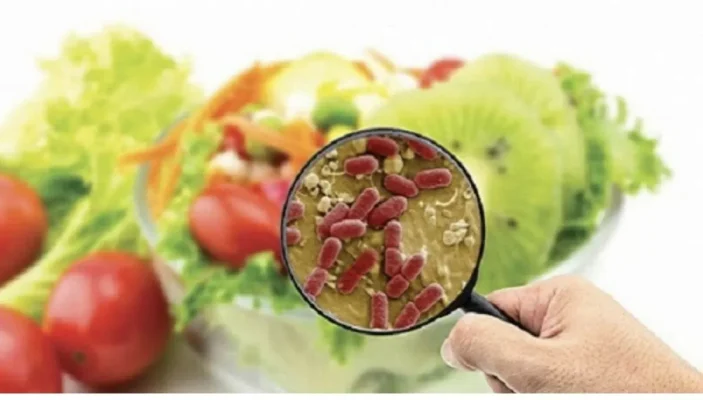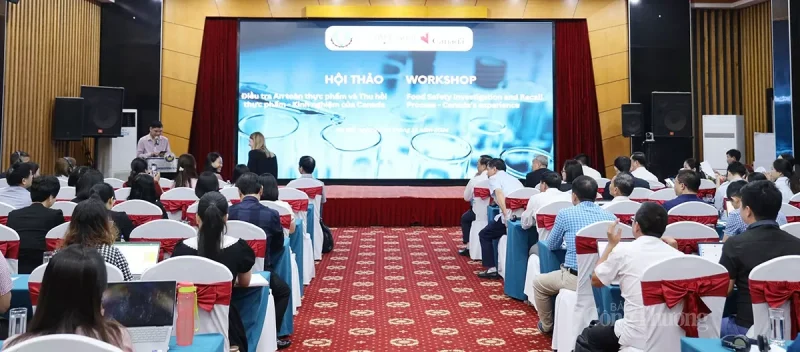Source: Cong Thuong Newspaper
The SAFEGRO project is helping Vietnam protect consumers from preventable foodborne illness.
Food Safety: A Top Concern
Food safety remains a critical concern for both the public and authorities. Information about foodborne illness incidents garners significant attention. A quick Google search for “foodborne illness” returns approximately 7,250 results in just 0.26 seconds.

For example, in May 2024 a foodborne incident in Dan Phuong and Phuc Tho districts (Hanoi) affected 186 patients, caused by contaminated pickled radish. More recently, on November 30, a foodborne illness case in Ba Ria – Vung Tau involved 379 patients. Test results revealed bacterial contamination in all food samples from the implicated bakery as the cause.
According to Associate Professor Dr. Dang Van Chinh, Director of the Ho Chi Minh City Institute of Public Health, Vietnam continues to report significant foodborne illness cases. In addition to the incidents mentioned, there have been cases involving contaminated bread in Dong Nai and cream puffs in Thu Duc City (HCMC).
“When foodborne illness occurs, priority must be given to rapid control to mitigate immediate impacts. Simultaneously, identifying the cause, at-risk groups, and contaminated food is essential to prevent recurrence in the future,” emphasized Dr. Chinh.
Recalling Unsafe Products: An Urgent Requirement to Protect Public Health
When foodborne illness occurs, tracing the source and recalling unsafe products becomes an urgent necessity. In cases of acute poisoning, quickly identifying the cause and addressing it is critical to preventing more severe consequences.
Sharing Canada’s experience in managing food safety incidents, Mr. Pedro Chacon, a Food Safety Risk Expert at the Office of Food Safety and Recall at the Canadian Food Inspection Agency (CFIA), emphasized that preventing incidents before they occur is far more effective in terms of both public health and economics. Actions such as raising awareness, promoting food safety practices, and implementing continuous monitoring and prevention can significantly reduce the risk of food safety incidents. These measures also help build consumer confidence and raise business awareness about food safety.
To establish a robust national food safety management system, Mr. Pedro Chacon emphasized the importance of a solid modern legislative framework for food safety and fostering strong collaboration among food safety partners. A well-organized food safety system is crucial not only to prevent overlaps in roles and responsibilities among agencies but also to ensure that officers are well-trained and possess the expertise required to perform their specific functions effectively. This approach is key to achieving seamless and efficient operations.
When a food safety incident poses a potential health risk, Canada primarily employs a voluntary recall mechanism but has the regulatory powers to conduct a mandatory recall.
“Canada uses a risk-based food safety management system. Licensed businesses are evaluated based on the level of risk they represent to consumers. This establishment risk model allows to allocate inspection resources based on food safety risks. Additionally, risk assessments can be used to evaluate the likelihood of food causing illness. If a health risk is identified, appropriate risk mitigation actions, such as a recall, are considered. While most recalls in Canada are voluntarily initiated by companies, the country has the regulatory authority to enforce mandatory recalls” explained Mr. Pedro Chacon.
Strengthening the Food Safety System
To enhance Vietnam’s food safety capacity through knowledge sharing, inter-sectoral coordination, and benefiting consumers and stakeholders in the food and agricultural sectors, the Safe Food for Growth Project (SAFEGRO), funded by Global Affairs Canada, is collaborating with the Government of Vietnam. This technical assistance project is implemented by the Canadian company Alinea International in partnership with the University of Guelph, with the Ministry of Agriculture and Rural Development as the lead implementing agency in close partnership with the Ministry of Health, the Ministry of Industry and Trade, and other relevant agencies, spanning the period from 2020 to 2026.
Mr. Nguyen Hung Long, Deputy Director of the Vietnam Food Safety Authority – VFA (Ministry of Health), noted that while Vietnam’s food safety policies are relatively comprehensive, updating these policies to align with current realities is essential.

In November 2024, the VFA, in collaboration with SAFEGRO, organized two workshops on the Food Safety Investigation and Recall Process to share knowledge about how Canadian agencies coordinate during food safety incidents. “Sharing Canadian knowledge and experience is very useful for local managers, enabling them to trace the correct product line and recall it safely and effectively,” said Mr. Nguyen Hung Long.
Beyond workshops and training courses, SAFEGRO is undertaking various initiatives. According to Mr. Do Thanh Lam, Director of the SAFEGRO Project, one key initiative is the creation of the White Paper on Vietnam’s Food Control System, which highlights a shift toward a risk-based approach to food safety.
The project is also working to upgrade food safety conditions at traditional and wholesale markets, agri-food cooperatives, and processing facilities. It is implementing traceability applications for agricultural products, from farms to supermarkets and collective kitchens to facilitate recalls. SAFEGRO is equipping stakeholders with knowledge about food safety and communication methods, particularly targeting the education sector, starting with kindergartens where food safety awareness begins. The project conducts consumer awareness campaigns, organizes media events at markets, and utilizes other communication channels to empower consumers with knowledge of their right to access safe food at affordable prices.
“We hope the project will have a long-term and sustainable impact in Vietnam,” said Mr. Lam.
Ensuring food safety is undoubtedly a long-term journey. By fostering international cooperation and capacity building, the SAFEGRO Project is helping Vietnam progress toward its goal of protecting consumers from preventable food safety hazards, aligning with international standards, improving public health, and promoting sustainable development.

